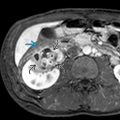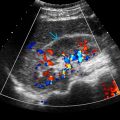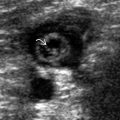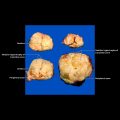KEY FACTS
Terminology
- •
Lipoma: Benign soft tissue tumor composed of mature adipose tissue
Imaging
- •
Subcutaneous location more common than subfascial (intra- or intermuscular)
- •
Well-defined, oblong-shaped, encapsulated mass
- •
Fine linear striations parallel to long axis of tumor
- •
Hyper- or isoechoic to adjacent fat with absent or minimal color Doppler flow
- •
Compressible similar to adjacent fat
Clinical Issues
- •
Most common soft tissue tumor
- •
Soft, well-defined, painless mass enlarging over months, often during period of weight gain
- •
Classic appearance can be diagnosed definitively with ultrasound
- •
Atypical appearance needs evaluation with MR or biopsy
- ○
Large size, deep location, heterogeneity, vascularity, crossing fascial planes, rapid growth
- ○
- •
MR is better than ultrasound in differentiation of benign or malignant lipoma and in assessing deep masses
Scanning Tips
- •
Scan in area directed by patient in position they report is most exacerbating
- •
Use compression to demonstrate soft character of mass
- •
Use extended field of view to capture larger masses
- •
Use light pressure when assessing for color Doppler flow to avoid false absence from compression
- •
Look for “neck” as fat-containing ventral and lumbar hernias can mimic lipomas










